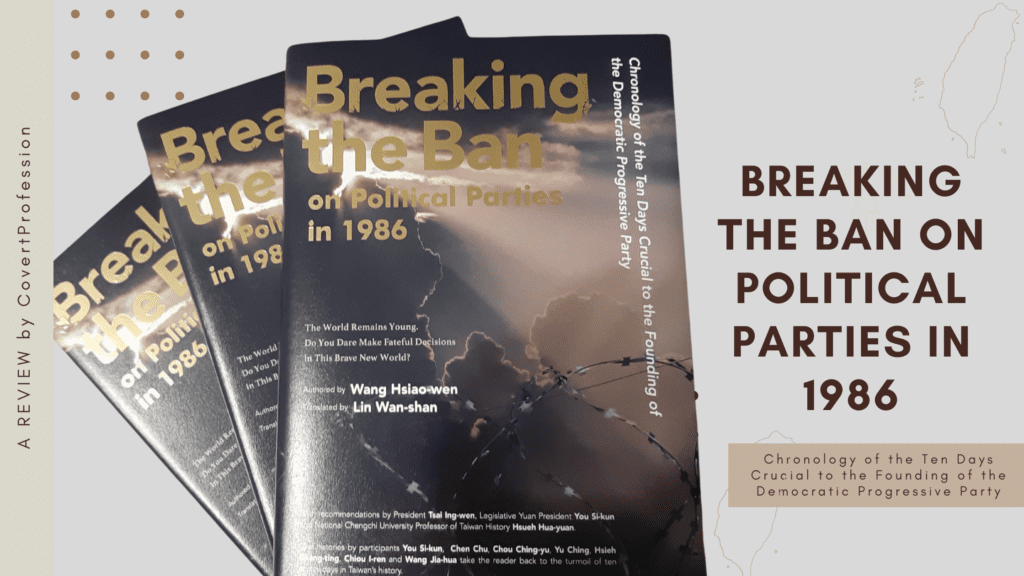With the Taiwan Presidential Election 2024 well and truly upon us, it’s time to test your knowledge of politics in Taiwan. From historical resources in English on the DPP website to films like Formosa Betrayed, there are plenty of ways foreigners can learn about politics under the KMT’s rule of martial law in Taiwan.
However, ‘Breaking the Ban on Political Parties in 1986’ is actually the first book that details the establishment of the DPP alongside oral testimonies from those who were there and those who birthed the party. And it’s in English, which is a huge plus.

In this article, I’ll give a bit of background to the book, followed by a comprehensive review and recommendations for further resources to learn more about politics in Taiwan.
History of the DPP
The Democratic Progressive Party was founded on September 28th 1986. This was at a time of martial law in Taiwan under the Kuomintang (KMT) Chinese Nationalist Party, therefore the organization that started the Party, the Tangwai, were not even officially recognized by the KMT.
Since 1949, the KMT had imposed martial law in Taiwan, effectively banning all opposition parties, banning any news outlets from disseminating critical opinions, and imposing the death penalty on individuals who were accused of dissenting thought. When considering this political climate, it becomes even more amazing that the Tangwai even managed to gather to form a political party.
Yet perhaps this had something to do with the ‘benevolence’ of then-president Chiang Ching-kuo. Whatever the reason, the events denoted in this book compelled President Chiang Ching-kuo, the only legitimate son of dictator Chiang Kai-shek, to dissolve Taiwan’s martial law on July 15th 1987 and accept new political parties.
Hence why the book is entitled ‘Breaking the Ban on Political Parties in 1986’.
Review of Breaking the Ban on Political Parties in 1986
Pros
“In 1986, with Taiwan under the crushing weight of martial law, the Democratic Progressive Party was founded, breaking through the ban on starting new political parties. All political figures opposed to the government, referred to collectively as the “Tangwai”, were under surveillance. Freedom of assembly was largely curtailed.
So how was it that the Democratic Progressive Party was founded at the Grand Hotel – known for being a Kuomintang bastion swarming with secret agents? And in the first 10 days after the party’s founding, what did the participants do to ensure that their action[s] would stick even as they faced imminent arrest? How did they find the courage to be trailblazers for democracy, holding on to the hope of bringing light to the darkness?“
– Breaking the Ban on Political Parties in 1986 (blurb)
‘Breaking the Ban on Political Parties in 1986’ recounts, in the form of oral histories and historical materials, the 10 days most crucial to the founding of the Democratic Progressive Party in Taiwan, as well providing a historical overview of important events in the years prior and following.
As such, the book is a celebration of the DPP: a party that was founded under the iron fist of the Kuomintang (KMT Nationalist Party) during martial law in Taiwan, a party that paved the way towards democracy in Taiwan, and a party that just recently celebrate their 35th anniversary.
It’s no wonder then that this book is readily pro-DPP, with jabs at the no good very bad KMT coming swift and often. There’s also a ton of inspirational language that leaves the reader with the feeling of having attended a motivational lecture provided by Google translate. Therefore, if superlatives and exaggerations are are not your style, you probably will not enjoy this book.
However, if you can accept that this is a form of publicity for the DPP, then ‘Breaking the Ban on Political Parties’ is genuinely interesting to read. It’s also fun of fun-ish facts like:
- The original design of the Democratic Progressive Party flag was similar to the Union Jack, with the white lines in the background. It was later modified to a cross to symbolize Taiwan being at a crossroads.
- You Si-kun, the midwife of the DPP and the main hero in this book, went on to be the Chairman of the Democratic Progressive Party (2006-2007), Taiwan Premier (2002-2005), and is now the sitting President of the Legislative Yuan.
- Chen Chu, a victim of the Kaohsiung Incident who served nearly 6 years in prison, was the former Kaohsiung Mayor (2006-2018) and is the current President of the Control Yuan (2020).
Cons
While the content of the book ‘Breaking the Ban on Political Parties in 1986’ is a solid read, there are several issues that have the potential to impact the effectiveness of the book’s message, such as inconsistencies and assumed knowledge.
1. Inconsistencies
Perhaps this is me being picky but there are several inconsistencies within the book. The most prominent example being that, over the course of a few paragraphs, the reader goes from learning about Chu Kou-jeng to Chu Kao-jeng. Is this a mystery person or a misspelling? Probably the latter but who knows?
As for the typos and formatting issues, these are unfortunate because the writing itself isn’t half bad; brush away the superlatives and cliches and there’s an intriguing side of a story that you definitely haven’t heard before.
2. Unexplained Incidents & Assumed Knowledge
While there is eventually a helpful table with some information about key incidents, there is a lot of assumed knowledge in the book that readers not well accustomed or familiar with Taiwan’s history, geography, or politics, will find challenging to grasp the full weight of.
A few examples include the Zhongli Incident and Kaohsiung Incident (also known as the Formosa Incident):
- Zhongli Incident (November 19th 1977): KMT was suspected of committing electoral fraud in the election for Zhongli’s Taoyuan County magistrate. Zhongli citizens then set fire to the local police station in protest.
- Kaohsiung Incident (December 10th 1979): Key Formosa Magazine members who had held a demonstration to commemorate Human Rights Day were arrested and sentenced by a military tribunal. Verdicts were released on April 18th 1980, where one life sentence and several 12 year to 14 year sentences were given.
In other words, if you are someone that is based outside of Taiwan and interested in learning more about the history of the Democratic Progressive Party (DPP), which is a very possible thing thanks to the Taiwan presidential election, it may be challenging for you to immediately understand the setting, context, and why it matters. But nothing a deep dive into Wikipedia won’t fix.
Other Books Relating to Political Parties in Taiwan
Fitting with the theme of politics that is taking center stage in Taiwan at the moment, why not delve into an Eslite bookstore and review the following books related to politics in Taiwan.
The White Power (白色的力量)
Yeah, the title isn’t great, and probably not what you would want to have on your resume when applying to the role of Taiwan president. But, like most things that relate to TPP hopeful Ko Wen-je 柯文哲, he doesn’t care.
So, is this the white supremist side of Taiwan that we know exists but has never been so blatantly discussed before? No. In this instance, white refers to the Taiwan People’s Party (TPP) colors and represents the “white force” of his allies that support a transparent government. Again, not a great name.
If you can put poor translation aside and know how to read Chinese, then this is an interesting two-part series that details Ko Wen-je’s former life as one of Taiwan’s most respected surgeons to political advocate of the Sunflower Movement, two term Taipei Mayor, and a staunch opposer of the DPP.
Thirty Letters for Young People From Father Gou (郭爸爸寫給年輕人的30則備忘錄)
For a more ‘lighthearted’ – although some might say patronizing – read, ‘Thirty letters for Young People from Father Gou’ is an interesting choice. Written by ex-Taiwan presidential candidate and Foxconn founder Terry Gou 郭台銘, this novel shares his life lessons with the younger generation.
That being said, with chapter titles such as X and X, I wonder what the ratio of young people to older people reading this book is. Either way, why not give it a go to practice your Chinese and patience.
More About the Democratic Progressive Party
The DPP is on a roll with this book release, as well as the newly released film ‘Invisible Nation’ which details Taiwan’s first female president Tsai Ying-wen’s rise to power and navigation of international attitudes towards Taiwan in these trying times.
A graduate of National Taiwan University, the most prestigious university in Taiwan, and LSE, Tsai Ying-wen is no stranger to challenges. Join her as filmmaker Vanessa Hope showcases her tenure as the President of Taiwan (a tenure which will come to a close in 2024).
While it’s nearly impossible to find a legal site to watch the film online, why not first enjoy a short trailer to whet your appetite: https://www.youtube.com/watch?v=O6TsLVW4tu8
That's all from me for now, but don't forget to check out Covert Profession's weekly updates on Taiwan politics and the upcoming 2024 Taiwan Presidential Election!

